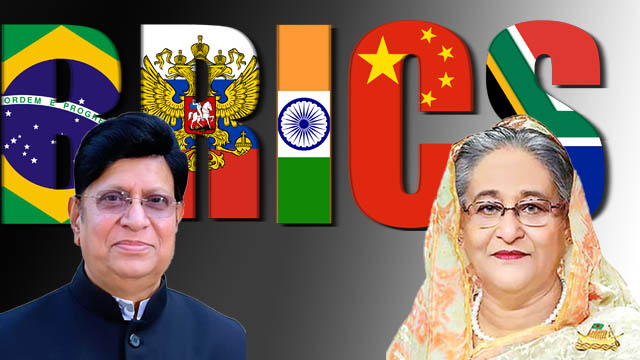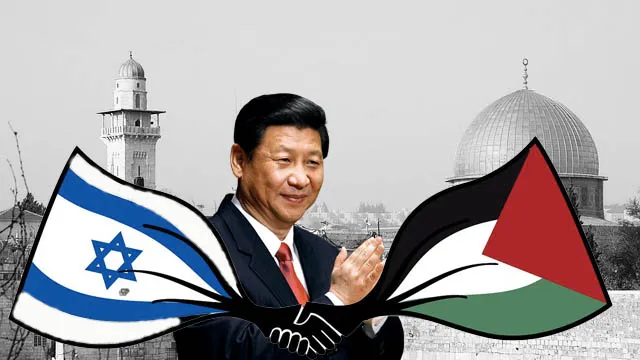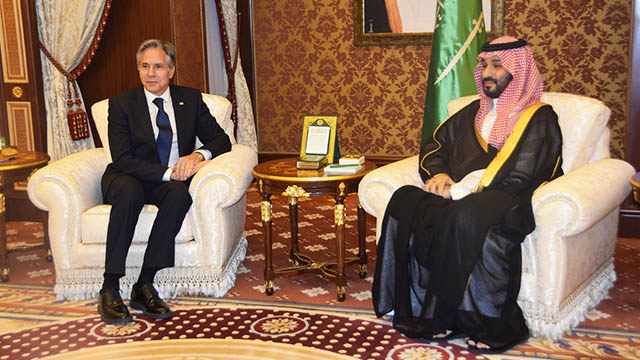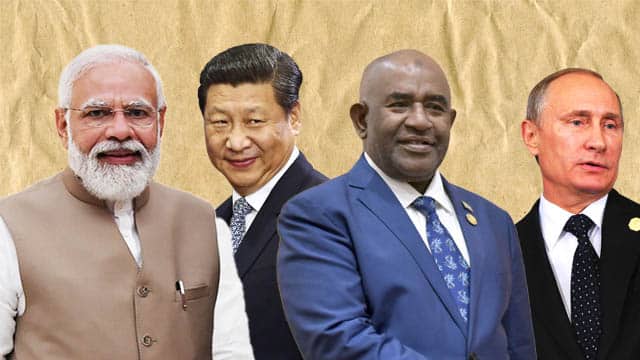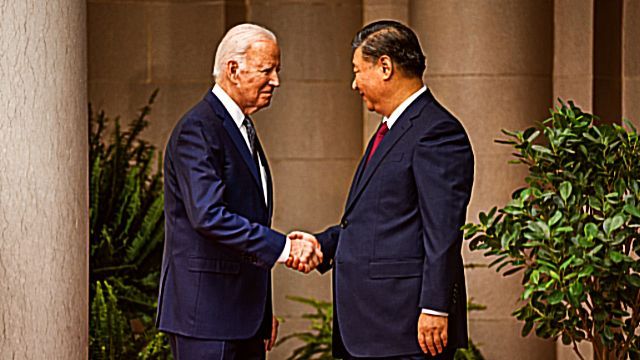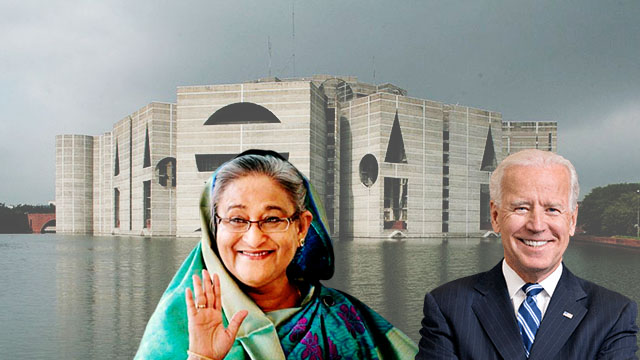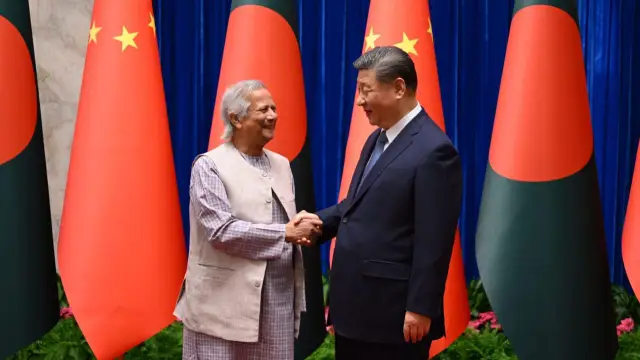After the Bangladesh government made clear its intentions to join the BRICS group, a fierce debate has been stirred amongst foreign policy experts of the country weighing the implications of the move.
On one hand, arguments are being made in favour of the South Asian country joining the new block of rising economies to both diversify its foreign relations and reduce dependency on the US and the West, but on the other hand, there are apprehensions of the move backfiring.
BRICS consists of countries like Brazil, Russia, China, India and South Africa.
For quite some time, Bangladesh has been exhibiting its interest in joining BRICS and in diversifying its foreign relations and reducing dependency on US dollars, as the US and Europe have been its top export destinations.
This has become crucial for Bangladesh at present as, on the one hand, its economy has been on a high-growth trajectory and is worth US$420.52bn, while on the other, there has been a growing rift between Dhaka and Washington DC, especially after the latter decided to introduce a controversial visa scheme for the country.
Following Prime Minister Sheikh Hasina’s meeting with South African President Matamela Cyril Ramaphosa in Geneva on June 14th, Bangladesh Foreign Minister AK Abdul Momen announced the intention to join BRICS. Hasina would reportedly visit South Africa to attend the BRICS summit in August.
“BRICS isn’t a military or regional power bloc; its membership conforms with Bangladesh’s foreign policy, which advocates for neutrality and peaceful relations with other countries”, said Delawar Hossain, a professor of International Relations and the director of the East Asia Study Center of the University of Dhaka.
With geopolitics coming to the forefront following the Ukraine conflict and the tensions around Taiwan, BRICS has become a power centre in international relations, said Hossain. He is also the founder-chair of the Knowledge and Resources Foundation (KRF) in Dhaka and the Center for Bangladesh and Global Affairs (CBGA).
He added that BRICS has become an important platform for countries and emerging economies of Asia-Africa-Latin America to discuss their common challenges and opportunities, which are quite different from those faced by Europe or the US.
Kawsar Uddin Mahmud, a research analyst at CBGA, highlighted the economic benefits that Bangladesh can derive by joining BRICS.
Underscoring the fact that the five BRICS countries are home to 40% of the world’s population and they collectively contribute 31.5% of the global GDP vis-a-vis 30.7% contributed by the seven rich countries that are members of the G-7 club, Mahmud said, “Considering the dynamics, more from an economic viewpoint, Bangladesh might benefit from increasing trade, investment, and commercial prospects with these countries due to the way they rank in the global economy.”
He added that entry into BRICS will give Bangladesh a platform to interact with other powerful countries, thereby boosting its regional influence in economic cooperation, regional security, and development projects.
“Financial help for infrastructure projects, development initiatives, and emergencies is available, through the Contingent Reserve Arrangement (CRA) and the New Development Bank (NDB) founded by BRICS members. Joining BRICS will provide Bangladesh access to these financial institutions, which could help it meet its infrastructure and development goals”, Mahmud commented.
Some experts opined that Bangladesh’s decision to join the BRICS is a move to exploit the opportunities of multilateral platforms and reduce its overall dependency on the US dollar.
Sheikh Shams Morsalin, a senior research fellow at the CBGA, feels that such a move can help Bangladesh act more independently in the global arena.
Stressing that Bangladesh’s foreign policy under Hasina follows the dictum of “friendship to all, and malice to none”, and it’s a “development first” policy, Morsalin said, “Bangladesh understands the potentiality of the growing economies of BRICS who will rule the global economy in the coming days.”
Morsalin emphasised that Bangladesh’s decision to join the BRICS is also guided by its future energy security needs as many of the OPEC countries also intend to join the platform.
However, apart from energy and food securities, countries like Bangladesh also face major challenges like external influence on domestic politics, the continuous threat of a “regime change” covert operation, etc.
“At present, some South Asian countries have been coming under pressure exerted by external big powers. These are the extra-regional powers with their own matrix of geopolitical interests. There has been a polarisation globally and such polarisation has been affecting Bangladesh’s foreign policy and diplomacy”, said Hossain.
Differentiating the present era where the world is seeking multipolarity from the bipolar world order of the Cold War era, he added that now there are multiple powers and each has its interests.
“There is a larger interdependence now between countries, especially in trade. In this changed reality, none of the countries is going to follow the diktats of any superpower but build relationships with one another independently and for their self-interests. Hence, in this scenario, it’s more beneficial for Bangladesh to seek opportunities by becoming part of important platforms like BRICS, where more such countries are coming”, added Hossain.
Morsalin highlighted that Bangladesh has been keen to engage with the world in a balanced matter. He said, “Bangladesh is also opting for an assertive Blue Economy policy regarding the Bay of Bengal, as outlined under its recently declared Indo-Pacific Outlook. In this regard, Bangladesh shall not allow any specific country or power to take the upper hand in the area; rather, it will follow a balanced approach.”
However, experts stated there also remain many challenges for a country to join such platforms, which also require focus as they may considerably impact a country’s foreign policy goals.
“Possible challenges within the BRICS could be finding common ground on policies and priorities with other members, balancing competing interests, and negotiating potential power dynamics. Further, joining any international organisation is to some extent a ticklish choice that necessitates weighing the pros, cons, and potential effects on a country’s domestic and foreign policy goals”, Mahmud said.
As the decision of Bangladesh to join BRICS may create uneasiness for the US, Mahmud warned that there could be several hurdles for Dhaka on the path.
“Regardless, the joining of Bangladesh will bring about a concern about the policies of the US regarding the region as they gauge BRICS as a peril to their version of politico-economic strategies. While India can geopolitically balance the US and Russia and maintain economic relations with China, Bangladesh, as a relatively smaller power, may confront some hurdles in this respect. After all, from an economic lens, without any misgivings, Bangladesh could benefit from BRICS and come up as a powerful actor in South Asia, after India”, he added.
While there is generally a positive view regarding Bangladesh becoming a member of the BRICS, there are certain apprehensions also. MA Razzaque, the chairman of Research and Policy Integration for Development (RAPID), is apprehensive about the short-term gains that Bangladesh can derive from joining BRICS.
“BRICS is a dynamic group of countries, and its model of cooperation is still emerging. Thus, in the short term, it is unclear how Bangladesh will benefit from it. But over time, this group has the potential to undertake more meaningful cooperation, especially in the areas of investment and technology transfer”, Razzaque said.
Altaf Parvez, a noted South Asia analyst and journalist, remains apprehensive about the end outcome of the decision.
“Bangladesh already has a deep friendship with some of the BRICS countries. As a result, what additional gains and losses can be associated with the new alliance? Bangladesh’s trade balance with BRICS countries is very negative. Joining the alliance does not seem to change the status quo. It is also difficult to predict that the BRICS countries will provide any additional diplomatic assistance to Bangladesh at all – at least nothing has been visible on the Rohingya issue.”
Abdullah Al Kafi Ratan, a central committee member of the Communist Party of Bangladesh (CPB), also showed apprehension regarding Bangladesh’s decision to join the BRICS.
“Becoming a member of BRICS will open up a new opportunity for Bangladesh to get loans outside the World Bank, IMF and ADB. Bangladesh may be in an advantageous position in terms of infrastructure development and new investments. But Bangladesh will not be able to have any special advantage in terms of trade until the dollar’s dominance is broken and BRICS’s currency is created”, Ratan said.
The CPB leader highlighted the importance of creating a common BRICS currency to mitigate the risks for Bangladesh and make the decision beneficial for it.
“Bangladesh mostly imports from China, Russia and India. Bangladesh’s main export product is ready-made garments. Europe and the US are the main buyers of garments made in Bangladesh…In this reality, where will Bangladesh get currency from China, Russia and India for import? As a result, Bangladesh will not be able to take much advantage of being a member of BRICS until a common currency system is created. Although there may be some benefits regarding obtaining foreign loans”, Ratan said.
Bangladesh is now the 35th-largest economy in the world. Bangladesh intended to join the BRICS soon after the BRICS Bank invited it as a guest.
Earlier in June, Momen had virtually attended the Friends of BRICS Foreign Ministers’ Meeting organised by South Africa. On Monday, June 19th, he commented that Bangladesh is ready to join BRICS as soon as it receives a formal invitation from it.
“We will surely join once they invite us. We are yet to receive any formal letter (inviting us to join). BRICS leaders are thinking of taking some emerging economies – around eight new countries including Saudi Arabia, United Arab Emirates, Indonesia and Bangladesh”, Momen told reporters.
Earlier, Bangladesh has become a member of the NDB set up by the BRICS members. The NDB reportedly offers far more independence to borrowers and is free from veto powers exerted by any country, unlike the World Bank. “Sensitive investment projects, when financed through NDB, can help address any concern through transparent sharing of information”, Razzaque, a trained economist, commented.
Bangladesh isn’t the only country intending to join the BRICS. According to Russian Deputy Foreign Minister Sergey Ryabkov, nearly 20 countries want to be a part of the BRICS platform.
“The list of candidates for joining the association continues to increase. The number of states interested in joining this association is nearing twenty. It reflects BRICS’ growing and already considerable role in the international arena as an association of countries with similar positions. I would like to stress it”, Ryabkov was quoted by TASS.
Tanmoy Ibrahim is a journalist who writes extensively on geopolitics and political economy. During his two-decade-long career, he has written extensively on the economic aspects behind the rise of the ultra-right forces and communalism in India. A life-long student of the dynamic praxis of geopolitics, he emphasises the need for a multipolar world with multilateral ties for a peaceful future for all.

